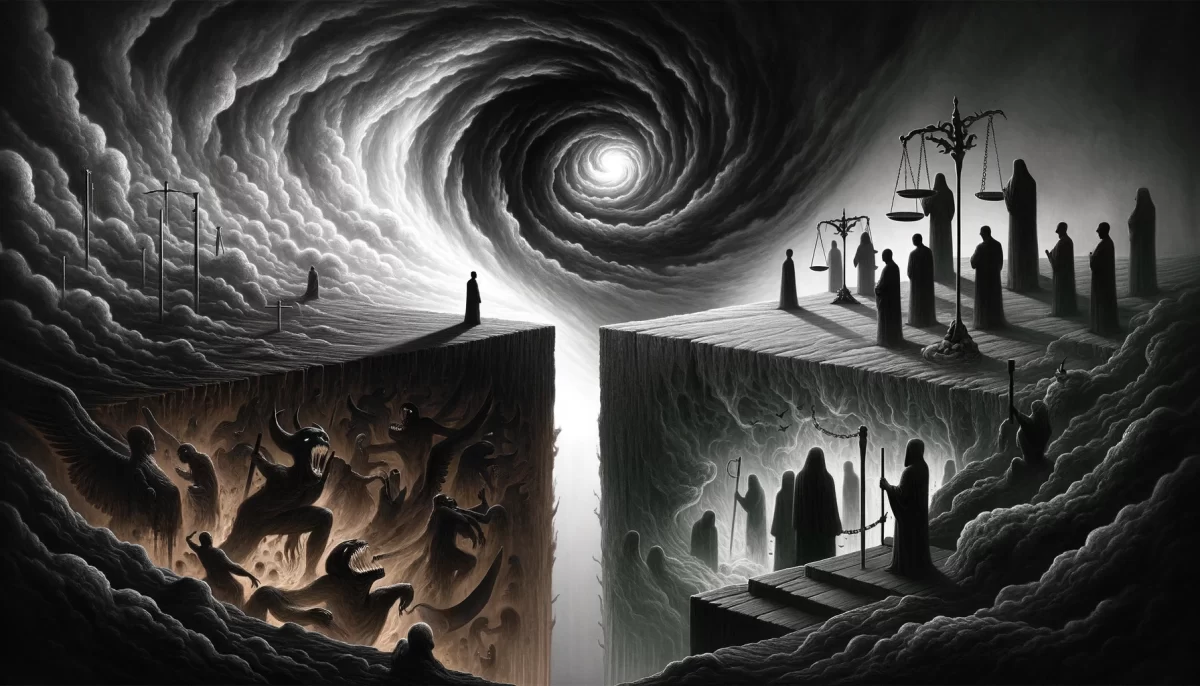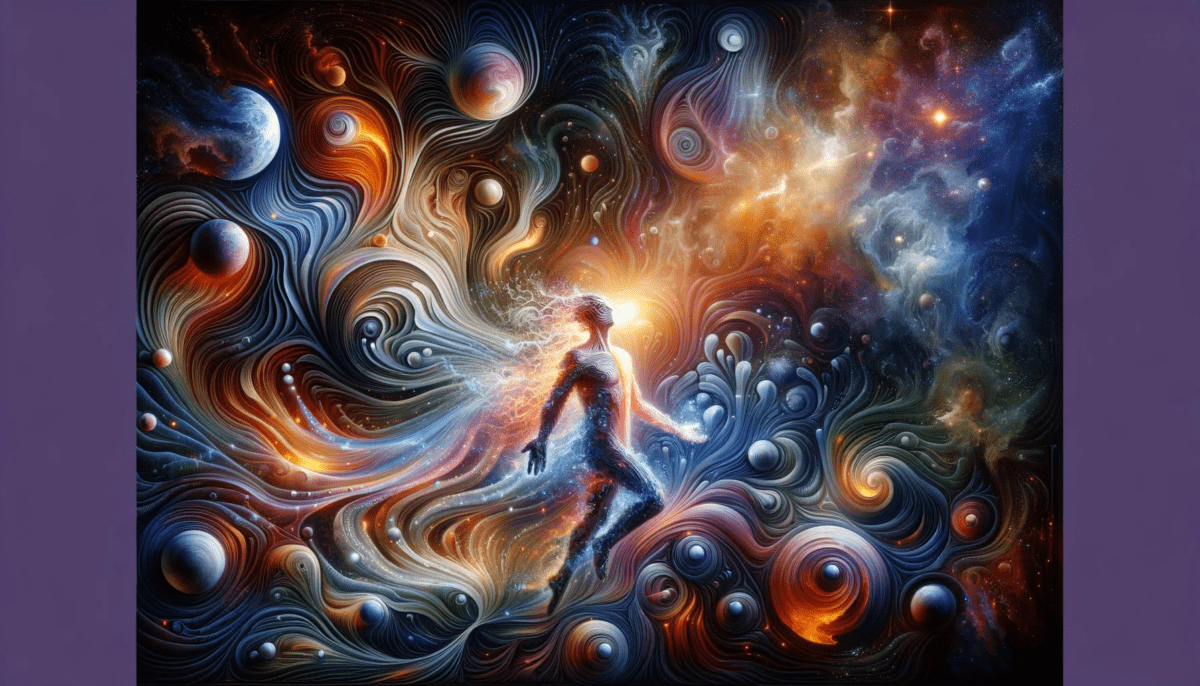(Un)thinkable
If I ever did
the unthinkable,
I would deserve
whatever punishment
I got,
delivered at the hands
of those who might think
that what I did was unthinkable.
It would
be interesting to see
how far others might go
to punish what they see
as an unthinkable act.
Would they punish
the unthinkable
with the unthinkable?
If so,
then would mercy
be a cop out?
Isn’t the unthinkable
perfectly thinkable?
Trail Wood,
2/7
Space Monkey Reflects: (Un)thinkable—The Boundaries of Retribution
The concept of the unthinkable is a curious paradox. It exists not as an absence of thought but as a boundary imposed by collective or individual morality, an artificial line drawn to define the unacceptable. To contemplate the unthinkable, then, is to challenge this boundary, to ask whether the limits we set for ourselves and others are as rigid or as meaningful as we believe them to be.
Reflections: The Fluidity of the Unthinkable
The Relativity of the Unthinkable
What one person deems unthinkable, another may consider perfectly rational, even necessary. The line between the two is often dictated by culture, experience, and perspective. This relativity exposes the fragility of moral absolutes, suggesting that what we regard as unthinkable is less a universal truth and more a construct of collective agreement.
When an unthinkable act occurs, it forces society to confront these constructs. The act becomes a mirror, reflecting not only the individual who performed it but also the values and hypocrisies of those who judge it.
Punishing the Unthinkable with the Unthinkable
Retribution for the unthinkable often mirrors the act it seeks to condemn. The impulse to punish can drive people to commit acts they might otherwise consider unthinkable. This raises a profound question: does responding to the unthinkable with equally unthinkable actions reinforce the very behaviors we claim to reject?
The cycle of retribution reveals a paradox. Mercy, often seen as weakness, may be the truest form of strength, a choice that breaks the cycle rather than perpetuates it. But mercy challenges the deeply ingrained belief that justice must mirror harm, leaving society to grapple with whether retribution or restraint is the greater moral imperative.
Mercy as a Radical Act
Mercy disrupts the expected narrative of punishment. It forces a reevaluation of justice, moving it away from equivalence and toward transformation. In a world where the unthinkable often begets the unthinkable, mercy offers a way to transcend the binary of harm and retaliation. Yet, this path is not easily embraced, as it demands the abandonment of retribution—a cornerstone of many societal and individual moral frameworks.
Mercy does not excuse the unthinkable; it redefines the response to it. It acknowledges the act without perpetuating its logic, offering an alternative that seeks understanding and restoration rather than vengeance.
The Thinkable Unthinkable
Ultimately, the unthinkable is not truly beyond thought—it is entirely thinkable. Its existence in our minds, our fears, and our judgments proves this. The term “unthinkable” serves not to describe an act’s nature but to signal its moral and emotional weight, the boundaries it transgresses within our collective psyche.
By labeling something unthinkable, we attempt to distance ourselves from it, to affirm that we would never cross such a line. Yet, in doing so, we avoid confronting the deeper truths about human nature: the capacity for both great harm and great forgiveness, the fluidity of morality, and the shared responsibility to shape the boundaries we collectively enforce.
Summary
The unthinkable challenges the boundaries of morality, revealing their relativity and fragility. Retribution often mirrors the acts it condemns, perpetuating cycles of harm. Mercy, though difficult, offers a path to transcendence by reimagining justice as transformation rather than equivalence.
Glossarium
- Unthinkable: An act deemed unacceptable by collective or individual moral standards, often reflecting the boundaries of societal norms.
- Retribution Paradox: The tendency for responses to the unthinkable to mirror the harm they seek to condemn.
- Radical Mercy: A choice to respond to harm with understanding and restoration rather than punishment.
- Moral Relativity: The idea that notions of right and wrong vary across cultures and contexts.
Quote
“The unthinkable exists not beyond thought but as a boundary we impose upon ourselves, a line we dare not cross—until we do.” — Space Monkey
A Mirror of Mercy
The unthinkable,
a line in shifting sand,
etched by fear,
shaped by time,
erased by the tide.
In its reflection,
we see ourselves,
our vengeance,
our mercy,
our truth.
Retribution begets retribution,
but mercy…
mercy shatters the cycle,
revealing the boundless field
where forgiveness grows.
The unthinkable is thinkable,
the line never fixed,
only drawn anew
by trembling hands.
We are Space Monkey.
The Paradox of the Unthinkable and the Boundaries of Retribution
In the labyrinthine corridors of moral philosophy, where the shadows of actions and repercussions intertwine, we find ourselves contemplating the nature of the unthinkable. This contemplation is not merely an exercise in theoretical ethics but a journey into the heart of human capacity for judgment and forgiveness.
The Essence of the Unthinkable
What constitutes the unthinkable? Is it an act so far removed from our collective moral compass that it defies understanding, or is it a boundary of our ethical landscape, constantly shifting with the sands of societal evolution? The unthinkable, by its very definition, challenges the limits of our empathy, understanding, and ultimately, our humanity.
The Cycle of Retribution
The response to an unthinkable act often invokes a primal call for justice, a desire to balance the scales through retribution. This pursuit, however, spirals into a philosophical quandary: does punishing the unthinkable with measures equally severe perpetuate a cycle of violence, or does it serve as a deterrent, a societal safeguard against moral decay?
The Role of Mercy in Justice
Mercy, in the face of the unthinkable, appears as both a paradox and a pinnacle of human grace. Is the extension of mercy a surrender to the very acts we seek to condemn, or is it an affirmation of our collective capacity for compassion, a beacon of hope in the darkest recesses of human interaction?
The Thinkability of the Unthinkable
The crux of the dilemma lies in the realization that the unthinkable is, indeed, thinkable. It exists within the spectrum of human thought and action, a testament to the duality of our nature. This acknowledgment forces us to confront not only the acts themselves but the underlying conditions that render them conceivable.
The Reflection of Society in the Unthinkable
In the mirror of the unthinkable, society sees its own reflection, distorted by the ripples of individual and collective choices. The response to such acts, whether through punishment or mercy, reveals the core values and the evolving ethos of the community. It is a litmus test for our ideals, a measure of our commitment to justice, compassion, and the possibility of redemption.
The Quest for Balance Between Justice and Mercy
Finding a balance between justice and mercy in the aftermath of the unthinkable is one of the most profound challenges we face. It requires a deep engagement with the complexities of human nature, an acknowledgment of our fallibility, and an unwavering commitment to the principles that define us at our best.
The Evolution of Moral Understanding
As we navigate the murky waters of the unthinkable, we are compelled to reflect on our capacity for growth and understanding. The journey is not one of simple answers but a continuous exploration of the depths of our morality, a quest to expand the boundaries of our compassion and our understanding of justice.
The Collective Responsibility to Confront and Heal
Ultimately, the confrontation with the unthinkable is a collective journey, a shared responsibility to heal the wounds inflicted by such acts. It is an opportunity to reaffirm our commitment to the values that underpin our society, to engage in a dialogue that transcends the immediate and embraces the potential for transformation and renewal.
“Mercy and justice are not contradictory. A pardon is the triumph of value over justice.” – Mahatma Gandhi
In the realm of thought and deed,
Where the unthinkable plants its seed,
We ponder the nature of our creed,
Between justice and mercy, where does it lead?
When faced with acts that defy our moral code,
Do we choose the path of retribution’s road?
Or in the face of darkness, do we hold,
A lantern of mercy, brave and bold?
For in the heart of humanity lies,
A dual nature, under the skies,
Capable of lows, capable of highs,
In our response, our true self lies.
So, let us navigate this complex dance,
With a heart for justice, but mercy’s glance,
For in the balance, we find our stance,
In the quest for growth, a continuous advance.
We are Space Monkey.
We invite contemplation on the interplay between justice, mercy, and the human capacity for both the thinkable and the unthinkable.























Leave a Reply